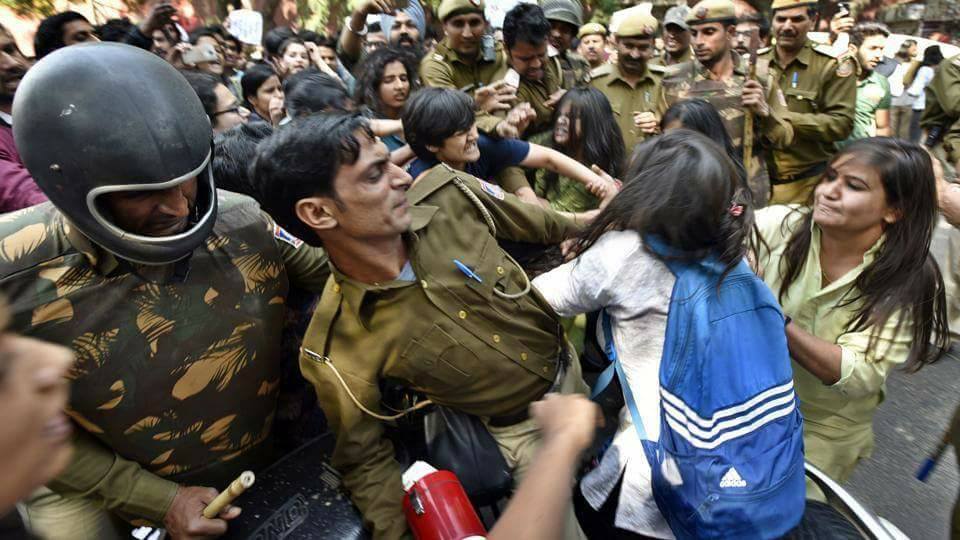Debates And Discussions Lose Space In India's Campuses
Ten days after Delhi University’s Ramjas College witnessed clashes and charged environment, students of Mumbai’s Tata Institute of Social Sciences (TISS) received a mail of six points from the administration. The last and the longest point in the mail read: “DU and JNU are very powerful institutions and they can afford to engage in matters of the kind that is happening there. TISS is a simple institution that is working very hard to stay afloat - do not get it trapped into difficulties.”
The mail meant that students must avoid getting involved in controversies.
For Mohan (name changed) and other students, the mail from the director meant that they were no longer free to express themselves. “When I joined TISS in 2016, I expected an atmosphere of debates. I thought I would get to share ideas here. But it seems so difficult even to put forward your stand on conflicts,” said Mohan, a student social work at TISS.
TISS is one of those institutes that are taking precautions to avoid situations that arose in Jawaharlal Nehru University in February 2016 and a year later in Ramjas College. “To express pro-Kashmir or pro-Bastar or anti-military stand, it means inviting troubles for yourself,” says Mohan.
Two years ago, a professor at TISS, who had expressed his stand on Kashmir, landed in trouble. The subject that he was teaching was struck off the course. He is now teaching subsidiary subjects. Such moves by the administration have made the students hesitant to speak their mind. “The institute wants us to make a good dissertation, take a good placement and leave,” says Mohan. Students are perturbed at the loss of space for free debate and surveillance from the authorities.
“Once we were writing the script of a drama in the college canteen. An unknown man on the adjacent table kept observing us. After a while, he started recording us on his phone,” Mohan narrates. When students around questioned him as to why he was recording, the person said that he was doing it casually.
In JNU, which landed in controversy in February 2016 for organising an event marking Afzal Guru’s death anniversary, the court cases against students are still going on. The students there feel that the government and the university authorities are “distorting progressive education policy and free thinking that JNU stands for”.
“All forums, where decisions were earlier deliberated upon, are being bypassed. Majority of the decisions are being taken by the Vice Chancellor solely,” says Mohit Kumar, President of JNU Students’ Union. Kumar is a PhD scholar at JNU and a member of All India Students’ Association (AISA).
From court cases and FIRs against the students to the seat cut and financial crisis in JNU, students decry “political motives”.
The authorities at JNU are also planning a clampdown at hangout places in the campus. The famous dhabas of JNU, which remain open till late in the night, may soon face restrictions on timings. “The authorities say that the late night timings of dhabas disturb them and the college wardens. They even tell us that the dhabas are compromising with the environment of the campus,” Mohit says.
In August last year, the JNU administration had ordered the famous Ganga dhaba to be closed. This place has been a hotspot for debates, discussions and protests.
Ramjas College has been the latest incident in campus controversies. The organisers had invited Shehla Rashid and Umar Khalid of JNU to speak at a seminar “The culture of protests”. The guest list did not go well with the Akhil Bharatiya Vidyarthi Parishad (ABVP), student wing of BJP. Violent clashes rattled Ramjas for two days.
The college authorities are now taking precautions to avoid more such incidents, but it is taking a toll on the students’ rights. Organising events is not that easy now. “Before organising events, the administration inspects everything, from the number of posters to the guest list,” says one of the students of Ramjas College, wishing anonymity.
The principal of Ramjas College, PC Tulsian, agrees that the college authorities are “keeping an eye on the activities in college but in a democratic way.”
“People have liberty. One person may want to talk on a topic which is not liked by others. Such conflicts may affect our college’s reputation and academics,” Tulsian says. He deems certain curbs necessary for the “sake of college’s goodwill”.
For its annual theatre festival, St. Stephen’s College used to invite other colleges. However, this year, no college was invited for the fear of being caught in a controversy. St. Stephen’s College has so far stayed away from any major controversies.
Interestingly, at the Academic Conclave of St. Stephen’s College in March this year, a policeman dressed as a civilian attended the event. He approached the organisers asking about the speakers. When the organisers asked the man about his purpose of questioning, he said that he was from police. He wanted to keep a record of the things happening there. “I have been in this college for three years and have organised events. But we never witnessed such an incident,” says one of the student organisers of the conclave.
The college management seemed to have no problem with the police official’s presence, said the students.





